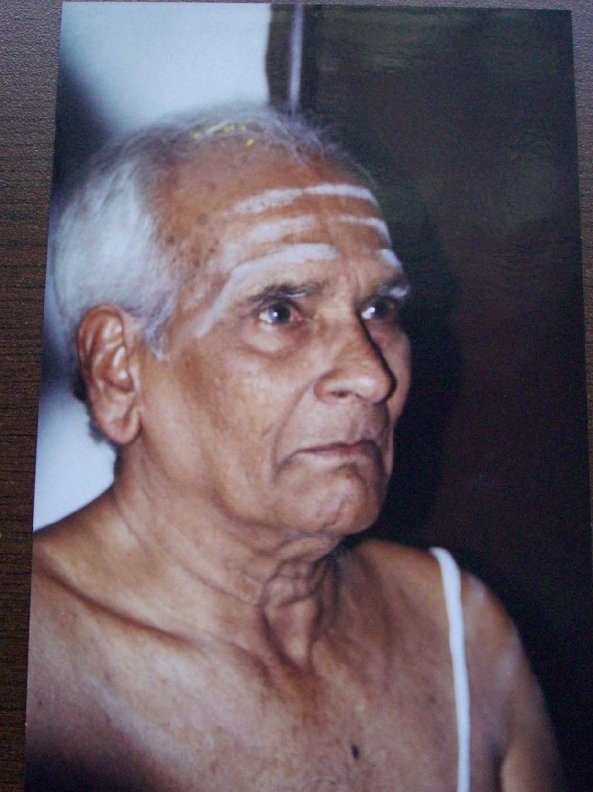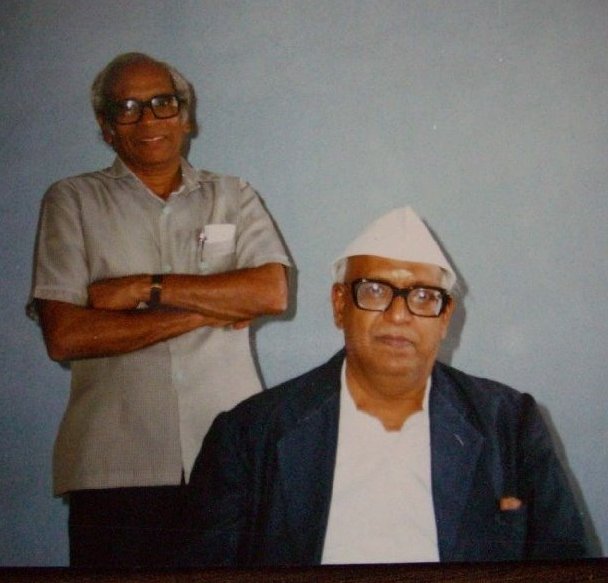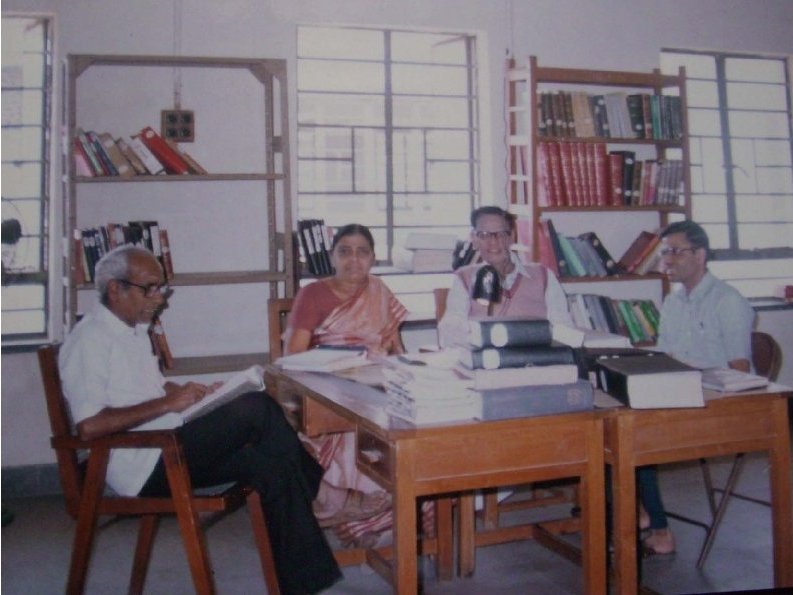K. VENUGOPALAN
(1st December 1922 – 2nd August 2007)


Though many of us knew Venugopal for half a century and rather closely, yet we find it difficult to write about him. He was very reticent about talking about himself and to most of us, his early years are a blank. Like many of his Tamil Brahmin contemporaries, his life too in the early years was a grind. His father was casually and intermittently in employment and he alone, among his siblings, had the benefit of being educated in a college. Of his school days, we know very little. The college he went to, the Kumbakonam College, had a respectable tradition being known to be one of the better centers of academic excellence. One of his senior college mates, T. Janakiraman was to emerge as a major writer of Tamil fiction.
He wanted to offer Sanskrit as his major, but, this was over-noted by his father for: "What would have been the future of someone who took Sanskrit?" Obviously, his father wanted him to enter into the coveted government civil service and reluctantly he majored in mathematics. According to the then worldly wisdom, if one took to Sanskrit studies, he would be fit to become a poorly paid religious ritual specialist. However, he took Sanskrit as one of the subsidiary subjects. There was no learning in the family and Venugopal’s interest in wanting to take Sanskrit as a subject of study was intriguing. His grandfather (father’s father) was a regular reader of the Vālmīki Rāmāyana and the text was ''religiously read” everyday as part of a sacredotal ritual. He used to read it regularly and Venugopal was a willing listener to both, the readings and to the exposition of the finer points of the text. This early exposure was to be of immense influence on the mental make-up of Venugopal.
 He was fortunate in his college days to have as his Sanskrit teacher
Mahamahopadhyay V. S. Sastri, who encouraged him to freely
use the rich collection of Sanskrit books in the college and to guide
him in the choosing of books. Sastri was to be a great influence on
him. When he passed his BA examination, he got prizes in proficiency
and performance in Sanskrit. And a copy of the Vālmīki Rāmāyana
was the gift the college gave him. This was formally presented to him
in a college function which he was not able to attend. He had to be
satisfied collecting it later from the college office. He always
recalled with some understandable pride that the person who gifted the
prize book was the Right Hon. Srinivasa Sastri, himself a very good
student of the epic which he read regularly and on which he was to
deliver about twenty-odd lectures all in the evening of his life.
He was fortunate in his college days to have as his Sanskrit teacher
Mahamahopadhyay V. S. Sastri, who encouraged him to freely
use the rich collection of Sanskrit books in the college and to guide
him in the choosing of books. Sastri was to be a great influence on
him. When he passed his BA examination, he got prizes in proficiency
and performance in Sanskrit. And a copy of the Vālmīki Rāmāyana
was the gift the college gave him. This was formally presented to him
in a college function which he was not able to attend. He had to be
satisfied collecting it later from the college office. He always
recalled with some understandable pride that the person who gifted the
prize book was the Right Hon. Srinivasa Sastri, himself a very good
student of the epic which he read regularly and on which he was to
deliver about twenty-odd lectures all in the evening of his life.
Like most of his college mates he had to find an employment to keep the wolf from the door. Like many hundreds (during the days of the Second World War) he came to a new city Poona for employment in the office of the Financial Controller of Military Accounts. It was of course a modest job with an even more modest salary. However, it was just sufficient to meet his simple needs and yet find funds to remit home for the needs of the family----this remittance by money order was a monthly ritual that he never failed for several decades. It helped in keeping the kitchen fires lit and in the settling and educating his younger brothers.
The days in Poona were happy and carefree and he was to make many friends who remained close to him all their lives. However, with the prospects of the war ending there was an apprehension of immediate retrenchment and many among his colleagues got absorbed in other government establishments. Venugopal moved to the Railway service and was in Bombay. This must have been sometime in 1949 and for nearly a decade, he lived in Bombay. After a few years in Bombay he wanted to take advantage of the opportunities offered for higher education and enrolled as a student in the Wilson College in Bombay for his postgraduate studies in Sanskrit. This he was doing along with the office duties and he took special permission to attend the lectures which were held in nearby colleges. For his subsidiary specialization, he took Alaṃkāra Śāstra and English literature.
Having successfully and creditably cleared the examination, Venugopal wanted to spend the rest of his life in teaching and research. Resigning his railway position, he went to Madras and joined a newly founded educational institution: the Jain College. After a year he moved to St Josheph’s College, Tiruchirapally, and served in the college for a few years. St. Josephs’s was famous as a college. But he was not able to engage in research for his lecture duties were heavy.
 He decided to dedicate himself to research in Sanskrit and returned to
Poona once again to join the newly founded Dictionary Department of
the Deccan College. The Dictionary Project was one of the massive
engagements and Venugopal joined as sub-editor and retired from the
College after two decades and more of service.
He decided to dedicate himself to research in Sanskrit and returned to
Poona once again to join the newly founded Dictionary Department of
the Deccan College. The Dictionary Project was one of the massive
engagements and Venugopal joined as sub-editor and retired from the
College after two decades and more of service.
The college and its ambience helped considerably in deepening the study and understanding of Sanskrit. It had some of the best minds in the world of Sanskrit and daily interaction with them widened the perspectives of Venugopal. Also it was usual for him and few colleagues to study particular texts slowly weighing every word almost everyday and this deepened his knowledge of several branches of Sanskrit studies. Almost every scholar of international standing would spend a few weeks in the college, and discussions and interactions with them were to be mutually rewarding.
In addition, a number of students from almost the entire globe would be in the college, studying specialized texts and often seeking his help in points of detail and that needed elucidation. These he undertook with enthusiasm and they were to be grateful to him for his ready sharing of his knowledge. Also, the magnificent library of the college and its collections to which Venugopal had a free run and his familiarity with them was valuable for his students and for Venugopal himself. To the end of his life, he was to act as a mentor to many of the international scholars, Belgians, French, American, Canadian, Japanese. Not many had so many students from so many quarters of the globe.
Venugopal was requisitioned by the Department of Indic Studies, University of Toronto, where he spent a year (1969-1970) in the Department of Sanskrit with a fine band of colleagues. Among them was Brimal Matilal with whom he interacted on philosophical and logical texts. Later, Matilal was to go to Oxford before he finally joined the Asiatic Society, Calcutta as Professor of Sanskrit.
Venugopal was a much sought after teacher mainly because of his capacity for hard work, his patience and striking academic honesty, confessing that he did not know what was not clear in the texts that he elucidated if the text was obscure and he did not offer fancy explanations. He was liked by all. After many years his students made it a point to call on him when they came to Poona, testifying to warm feelings on either side.
In all the things that Venugopal did he was unencumbered by pressing familial responsibilities for which he was deeply appreciative of his wife, who ungrudgingly gave him the freedom to engage himself fully in the world of Sanskrit.
Written by Dr R Srinivasan, Retired Prof and Head, Department of Political Science, University of Bombay. Dr RS has been Venugopal’s closest friend since the 1940s till date!